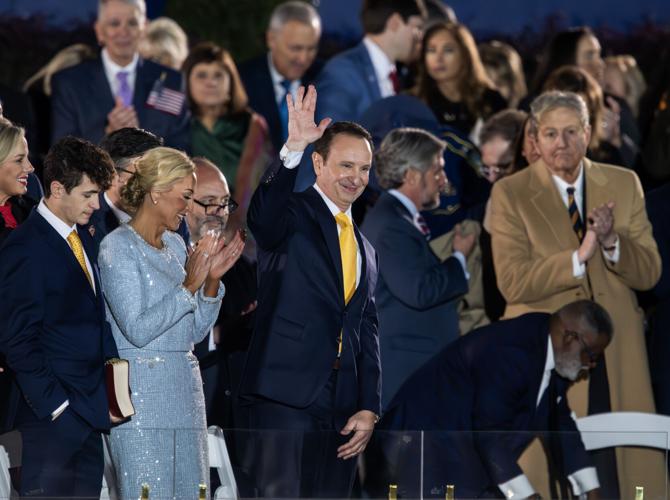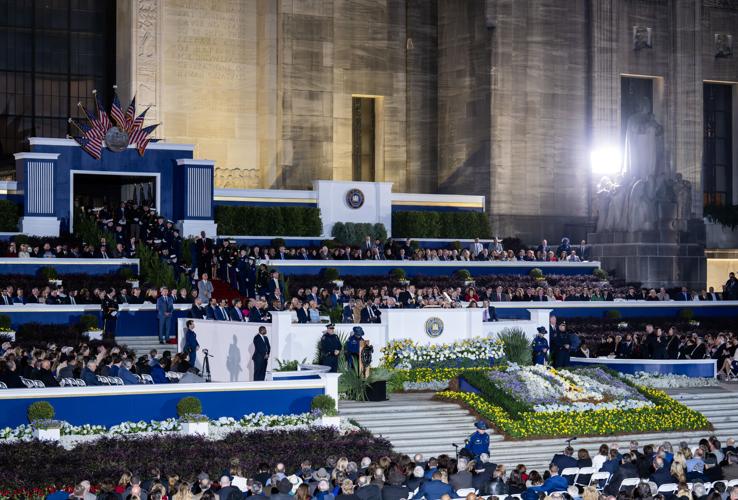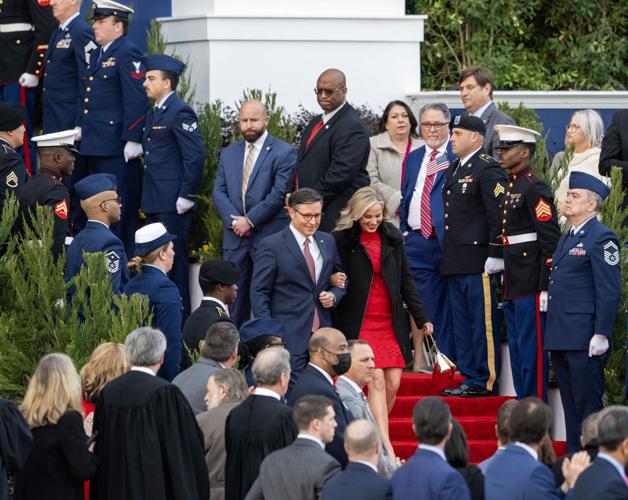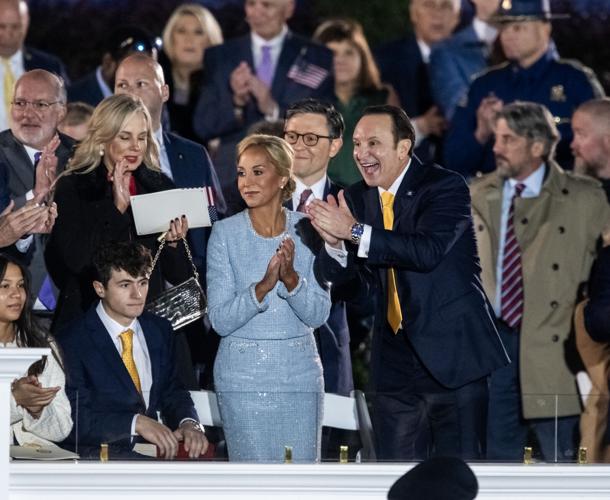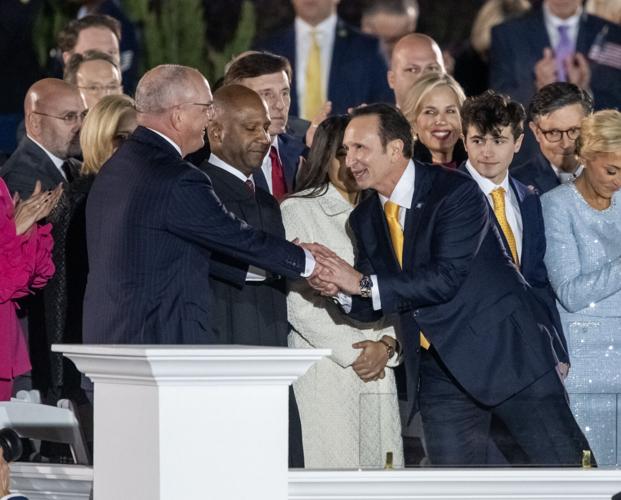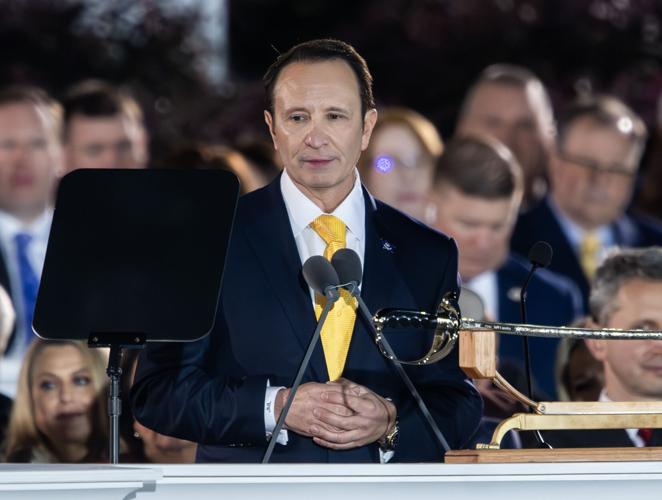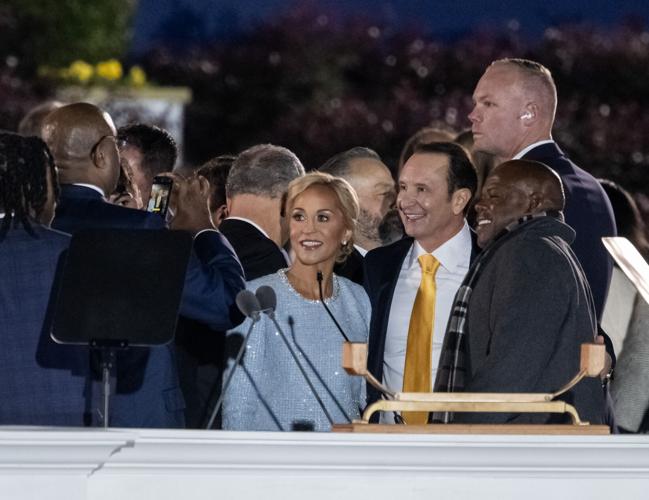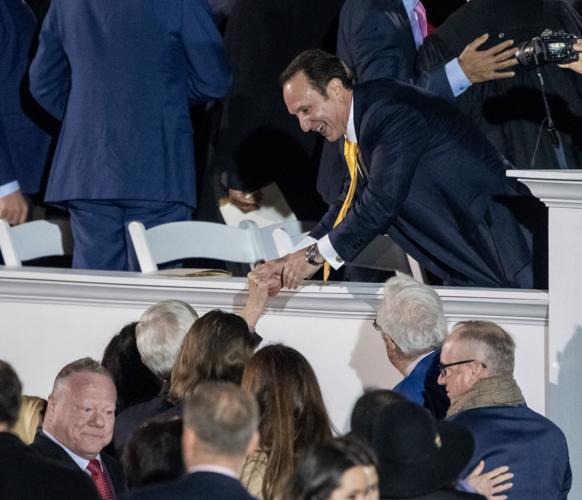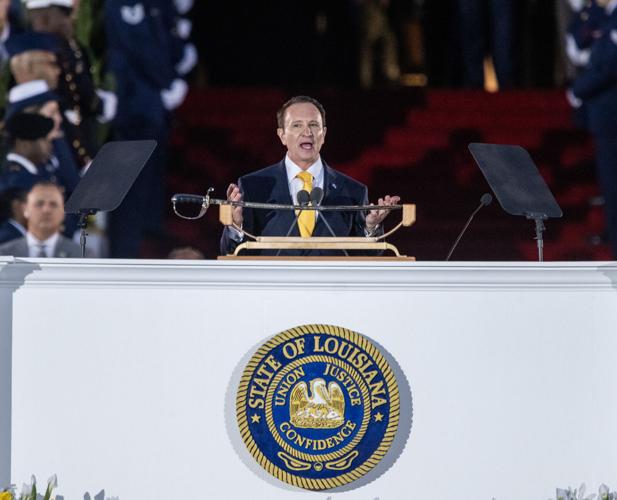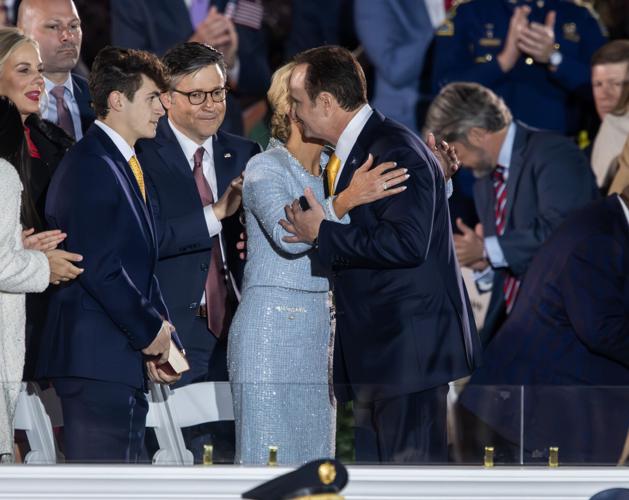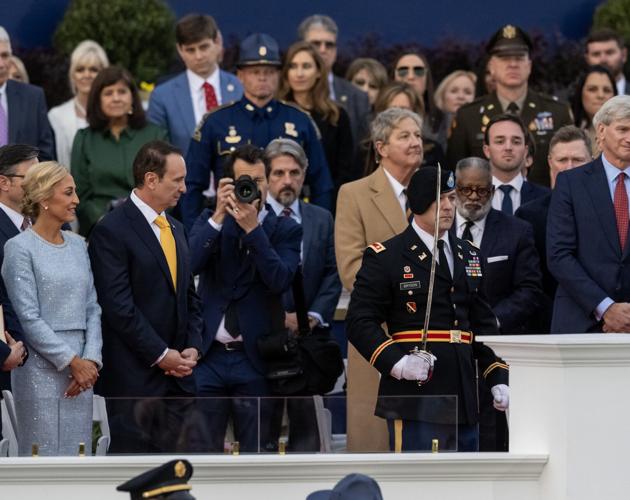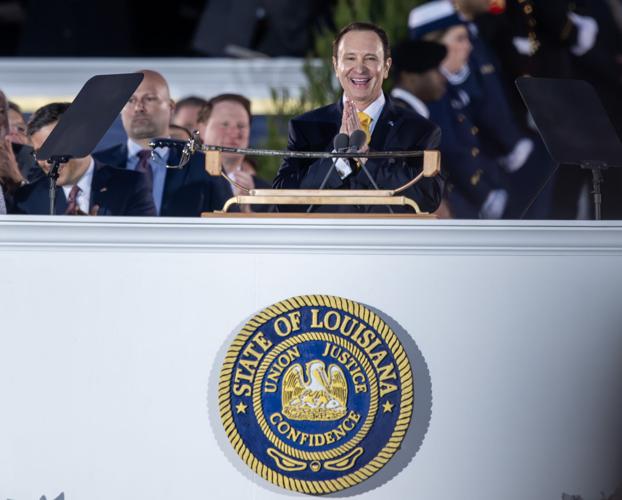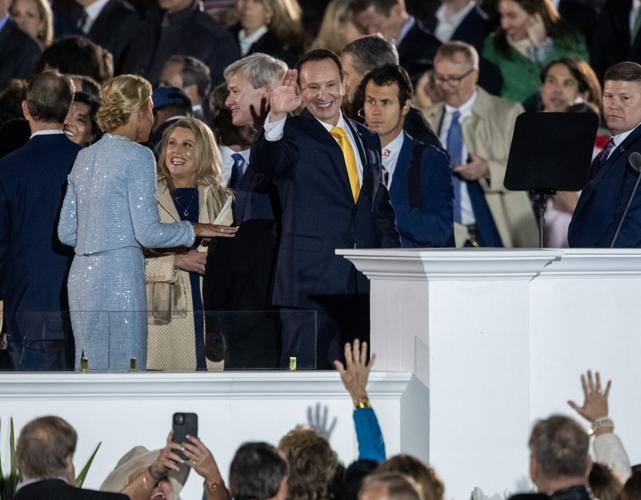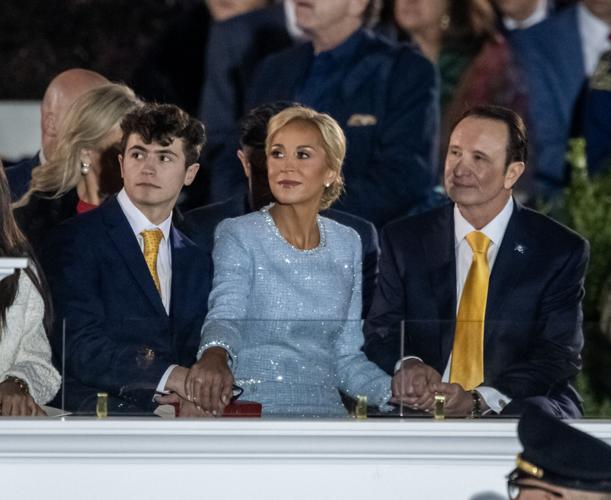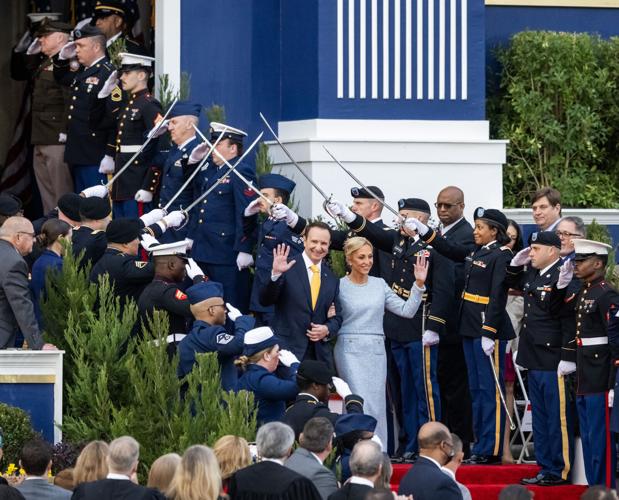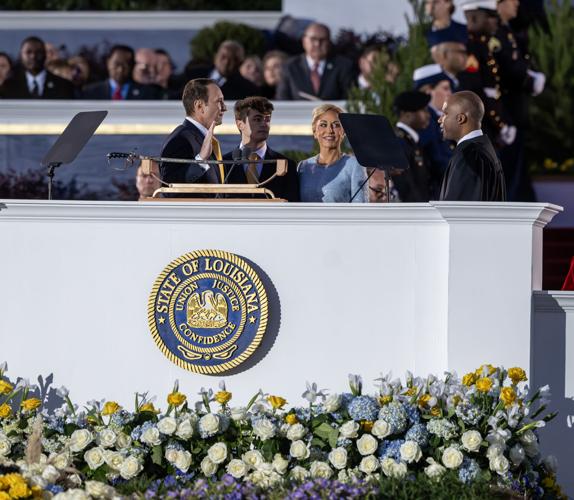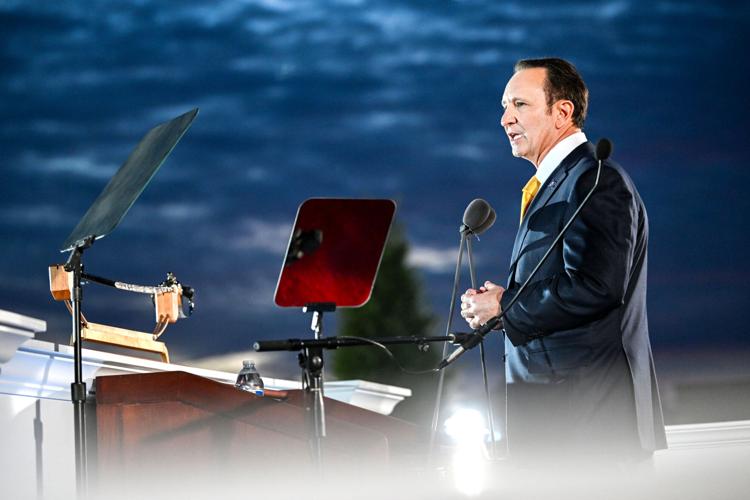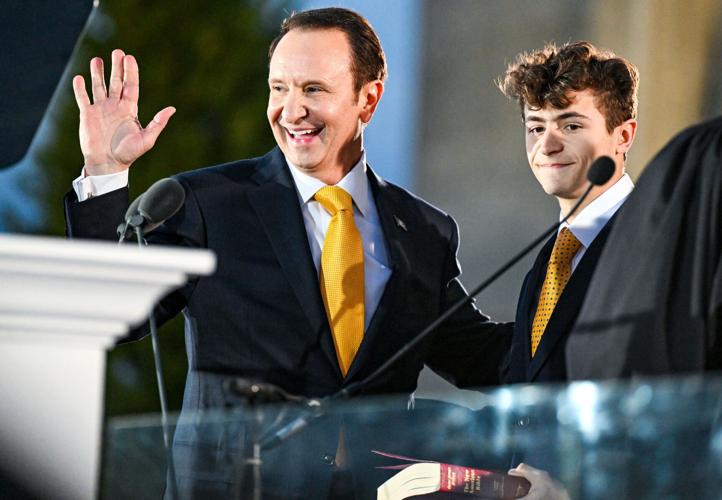Jeff Landry extolled Louisiana’s virtues during his inauguration Sunday as the state's 57th governor, calling for unity as he launches a new era of conservative leadership that is expected to dramatically reshape the state’s policies.
“Failure in this state is not an option anymore,” he said to applause.
The coming days will see Landry and the Republican-dominated state Legislature begin to pull Louisiana to the political right after eight years of leadership by the outgoing Democratic governor, John Bel Edwards.
But on Sunday, Landry, a Republican who previously served eight years as state attorney general and two years in Congress, delivered a 25-minute address on the steps of the State Capitol that offered broad promises of collaboration and saluted the “indomitable spirit” of the Louisiana people.

Governor Elect Jeff Landry gives a speech after being sworn into office during inauguration at the capitol on Sunday, January 7, 2024.
Against the backdrop of a vibrant winter sunset, he spoke reverently about Louisiana’s natural resources, its history and the diversity of its residents. Four times, he said he was “humbled” to assume the governorship and hailed his inauguration as a “new day” for the state, asking officials to put politics aside in the interest of moving the state forward.
“Our problems cannot find resolution whenever political divide becomes the antitheses to solution,” Landry said.
Yet Landry’s speech evoked some of the conservative grassroots issues that have been hallmarks of his political career and have ignited debate in Louisiana and beyond in recent years: He called for an aggressive response to “senseless, uncivilized and outrageous” violent crime and for "indoctrination behind mothers’ backs” and “unsuitable subject matter” to be rooted out of public schools — an allusion to conservatives' efforts to restrict access to some educational materials with LGBTQ+ themes.
And he hinted at his long-held skepticism of mainstream climate science, touting a need to look beyond “spoon-fed” facts when crafting environmental policy.

Governor-elect Jeff Landry and his wife Sharon walks down the steps at the Capitol building during the 57th Governor inauguration on Sunday, January 7, 2024 in Baton Rouge, Louisiana.
Landry, 53, won’t formally take office until noon on Monday, but he held the inaugural ceremony a day early because of a rain forecast for that morning. He still plans to hold his inaugural ball Monday night at the Raising Cane’s River Center in Baton Rouge.
Landry has charted a busy course in the weeks ahead. He plans to call a special session of the state Legislature from Jan. 15-23 to redraw the boundaries of Louisiana’s congressional and Supreme Court districts, creating new Black-majority districts for both. Political insiders also say he wants the Legislature to end the open primaries system of elections.
Landry has said he will call a second special session from Feb. 19 to March 6 to pass anti-crime policies that he believes will make Louisiana safer.
At the inauguration Sunday, Edwards sat in a front row seat, one row in front of his predecessor, former Gov. Bobby Jindal.
U.S. Rep. Mike Johnson, the Republican from the Shreveport area who became speaker of the House in October, was also present. So was Donald Trump Jr. — whose father, the former president, endorsed Landry.

Speaker of the United States House of Representatives Mike Johnson walks down the steps of the state capitol building with his wife Kelly for the inauguration of Governor Jeff Landry on Sunday, January 7, 2024 in Baton Rouge, Louisiana.
Other dignitaries included U.S. Sens. Bill Cassidy and John Kennedy, U.S. Reps. Julia Letlow, Clay Higgins, Garret Graves and Troy Carter, the lone Democrat in the congressional delegation.
Beginning under cloudy skies with a temperature in the mid-50s, the ornate inaugural ceremony took place by tradition at the Capitol, with a red carpet leading from the entrance down to the rostrum where Landry spoke. The event was marked by a 19-cannon salute and a fly-over by F-15 fighters from the Louisiana Air National Guard. American flags flew throughout Capitol Park.
The ceremony ended with fireworks over the Mississippi River as a recording played Ray Charles’ version of “America the Beautiful.”
In a nod to Landry’s background as a sheriff’s deputy and his political support for law enforcement, small “thin blue line” flags lined some of the Capitol garden walkways.
It was the first time in at least 50 years that the inaugural ceremony was not held on the same day that the new governor took office, said veteran politicos.
Landry inherits a much better fiscal picture than did Edwards in 2016.
While Edwards had to immediately plug a $2 billion budget deficit left behind by Gov. Bobby Jindal, Landry begins with a $330 million surplus — the latest in a series of rosier-than-expected tax hauls that came near the end of Edwards’ term.

Governor-elect Jeff Landry is sworn in during the 57th Governor inauguration on the steps of the state capitol building on Sunday, January 7, 2024 in Baton Rouge, Louisiana.
Landry also takes office under a much more favorable political climate than Edwards did eight years ago.
On that morning in 2016, Republican House members rejected the Democrat that Edwards wanted to name as speaker and instead chose one of their own, Taylor Barras, who regularly challenged Edwards’ agenda.
This time, Republicans are set on Monday to elevate Landry’s choices to the top two positions in Legislature, Sen. Cameron Henry, R-Metairie, as the president, and Rep. Phillip DeVillier, R-Eunice, as the speaker.
Republicans hold a 73-32 advantage over Democrats in the House and a 28-11 margin in the Senate.
Despite the big partisan advantage, both Henry and DeVillier have said in interviews that they plan to give committee chairmanships to Democrats, a move that will likely spark protests among hard core conservatives who want the incoming leaders to follow Washington’s practice of the majority party consolidating its power.
“I found Democrats who I think would be good chairmen based on their skillset,” Henry said.
A slate of Republicans who won office in the fall 2023 election cycle were also inaugurated on Sunday. Lt. Gov. Billy Nungesser was sworn in for a third term. Nancy Landry was sworn in as secretary of state, Tim Temple as insurance commissioner, Liz Murrill as attorney general, Mike Strain as agriculture commissioner and John Fleming as treasurer.
Republicans now hold all the statewide elected offices and a super-majority of the Legislature.
Things didn’t go well the last time Republicans were in complete control of government, from 2011-16 during Jindal’s second term in office, as the GOP oversaw a decimation of the state’s finances.
Even before taking office, Landry was feeling the weight of his new position.
“I think that anyone who gets elected to an office, almost any office really, but the higher the office, the greater the responsibility and the greater the weight should be on their shoulders,” he said in an interview. “Anyone who takes it lightly is destined to fail.”

Louisiana Governor Elect Jeff Landry smiles wide and waves to a crowd of thousands of supporters after being sworn in while next to his son, Jeffrey Thomas during inauguration at the capitol on Sunday, January 7, 2024.

